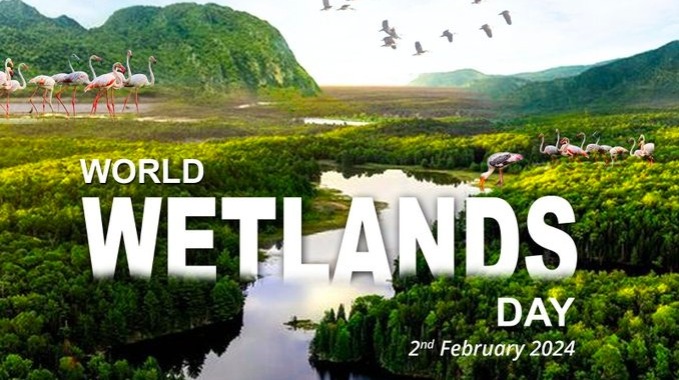India has reaffirmed its commitment to wetland conservation by adding five new Ramsar sites in Karnataka and Tamil Nadu, reaching a total of 80. This announcement, made two days ahead of the World Wetlands Day, highlights India’s dedication to safeguarding these vital ecosystems. Commemorated on Feb 2 every year, World Wetlands Day marks the signing of the Convention on Wetlands in 1971, a significant international treaty for wetland preservation.
The theme for this year, ‘Wetlands and Human Wellbeing,’ highlights the pivotal role wetlands play in enhancing human lives. These ecosystems provide flood protection, clean water, biodiversity, and recreational opportunities essential for health and prosperity.
To mark the occasion, the Ministry of Environment, Forest & Climate Change (MoEF&CC), in collaboration with the Government of Madhya Pradesh, is hosting the national World Wetlands Day event at Sirpur Lake, Indore, a Ramsar site designated in 2022.
India’s Wetlands
India’s diverse wetlands, shaped by various precipitation patterns, physiography, geomorphology, and climate, contribute significantly to its biodiversity. As a party to the Ramsar Convention since February 1, 1982, India leads South Asia with 80 Ramsar sites spanning 1.33 million hectares.
How wetlands combat climate change
Wetlands are acknowledged as a natural solution to combat climate change, acting as carbon sinks that absorb carbon dioxide and mitigate global heating. Often referred to as the “Kidneys of the Earth,” peatlands alone store twice as much carbon as all the world’s forests combined. However, when drained or destroyed, wetlands release substantial amounts of carbon.
Beyond climate mitigation, wetlands serve as buffers against floods, droughts, hurricanes, and tsunamis, contributing to climate change resilience.
Wetland conservation in India
India has implemented several initiatives for wetland conservation, including the Amrit Dharohar Scheme, National Plan for Conservation of Aquatic Ecosystems, Wetlands (Conservation and Management) Rules, and MoEFCC’s Wetlands Rejuvenation Programme.
Launched in 2020, the Wetlands Rejuvenation Programme employs a comprehensive approach involving baseline information development, rapid assessment through wetland health cards, stakeholder platform establishment, and comprehensive management planning. The initiative has covered over 500 wetlands, contributing to the conservation of critical habitats.










